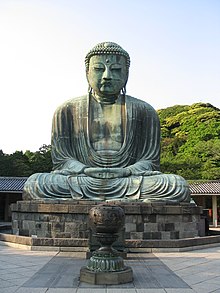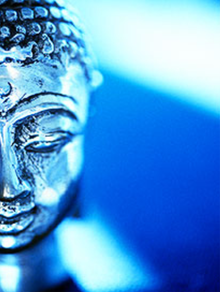Dhammapada

The Dhammapada is one of the primary collections of teachings attributed to Siddhartha Gautama, who is revered as the "Shakyamuni Buddha" and considered founder of the Buddhist traditions. It contains 423 verses in 26 categories, which, according to tradition, are answers to questions put to the Buddha on various occasions, most of which deal with ethics.
Quotes
[edit]
1. Yammakavagga: "The Pairs" (Verses 1-20)
- Mind precedes all mental states. Mind is their chief; they are all mind-wrought. If with an impure mind a person speaks or acts suffering follows him like the wheel that follows the foot of the ox. (Verse 1)
- Translator: Acharya Buddharakkhita
- Alternate translation: Phenomena are preceded by the heart, ruled by the heart, made of the heart. If you speak or act with a corrupted heart, then suffering follows you — as the wheel of the cart, the track of the ox that pulls it.
- Translator: Thanissaro Bhikkhu
- Alternative translation: All that we are is the result of what we have thought: it is founded on our thoughts, it is made up of our thoughts. If a man speaks or acts with an evil thought, pain follows him, as the wheel follows the foot of the ox that draws the carriage... If a man speaks or acts with a pure thought, happiness follows him, like a shadow that never leaves him.
- Translator: F. Max Müller
- "He insulted me, hit me, beat me, robbed me" — for those who brood on this, hostility isn't stilled. "He insulted me, hit me, beat me, robbed me" — for those who don't brood on this, hostility is stilled. Hostilities aren't stilled through hostility, regardless. Hostilities are stilled through non-hostility: this, an unending truth. (Verses 3-5)
- Translator: Thanissaro Bhikkhu
- Alternative: "He abused me, he beat me, he defeated me, he robbed me,"— in those who harbour such thoughts hatred will never cease. "He abused me, he beat me, he defeated me, he robbed me," — in those who do not harbour such thoughts hatred will cease. For hatred does not cease by hatred at any time: hatred ceases by love, this is an old rule.
- Translator: F. Max Müller
- Some do not understand that we must die, But those who do realize this settle their quarrels. (Verse 6)
- As rain breaks through an ill-thatched house, passion will break through an unreflecting mind. (Verse 13)
- Translator: F. Max Müller
2. Appamadavagga: "Mindfulness" (Verses 21-32)

- Heedfulness is the path to the Deathless. Heedlessness is the path to death. The heedful die not. The heedless are as if dead already. (Verse 21)
- Translator: Acharya Buddharakkhita
- Alternative: Earnestness is the path of immortality (Nirvana), thoughtlessness the path of death. Those who are in earnest do not die, those who are thoughtless are as if dead already.
- Translator: F. Max Müller
- Earnest among the thoughtless, awake among the sleepers, the wise man advances like a racer, leaving behind the hack. (Verse 29)
- Translator: F. Max Müller
3. Cittavagga: "The Mind" (Verses 33-43)
- Just as a fletcher straightens an arrow shaft, even so the discerning man straightens his mind — so fickle and unsteady, so difficult to guard. (Verse 33)
- Translator: Acharya Buddharakkhita
- Hard to hold down, nimble, alighting wherever it likes: the mind. Its taming is good. The mind well-tamed brings ease. (Verse 35)
- Translator: Thanissaro Bhikkhu
- Alternative: It is good to tame the mind, which is difficult to hold in and flighty, rushing wherever it listeth; a tamed mind brings happiness.
- Translator: F. Max Müller
- There is no fear for one whose mind is not filled with desires. (Verse 39)
4. Pupphavagga: "Flowers" (Verses 44-59)
- Death carries off a man who is gathering flowers and whose mind is distracted, as a flood carries off a sleeping village. (Verse 47)
- Translator: F. Max Müller
- Let none find fault with others; let none see the omissions and commissions of others. But let one see one’s own acts, done and undone. (Verse 50)
5. 'Balavagga: "The Spiritually Immature" (Verses 60-75)
- Long for the wakeful is the night. Long for the weary, a league. For fools unaware of True Dhamma, samsara is long. (Verse 60)
- Translator: Thanissaro Bhikkhu
- If a traveller does not meet with one who is his better, or his equal, let him firmly keep to his solitary journey; there is no companionship with a fool. (Verse 61)
- Translator: F. Max Müller
- A fool associating himself with a wise man all his life sees not the truth, even as the spoon enjoys not the taste of the soup. (Verse 64)
- Translator: Anonymous. Verses published by the Cunningham Press, USA; reissued by the Theosophy Company, Bombay, 1957.
- Whatever knowledge the fool acquires is not worked to advantage. That tarnishes his bright share of past merit and throws his head into disarray as he acts in the present. (Verse 72)
- Translator: Anonymous. Verses published by the Cunningham Press, USA; reissued by the Theosophy Company, Bombay, 1957.
6. Panditavagga: "The Spiritually Mature" (Verses 76-89)

- Should you find a wise critic to point out your faults, follow him as you would a guide to hidden treasure. (Verse 76)
- Irrigators channel waters; fletchers straighten arrows; carpenters bend wood; the wise master themselves. (Verse 80)
- Just as a solid rock is not shaken by the storm, even so the wise are not affected by praise or blame.
- Translator: Acharya Buddharakkhita
7. Sahassavagga: "The Thousands" (Verses 90-99)
- His mind becomes calm. His word and deed are calm. Such is the state of tranquillity of one who has attained to deliverance through the realization of truth. (Verse 96)
8. Sahassavagga: "The Thousands" (Verses 100-115)
- Better than a thousand hollow words
Is one word that brings peace.Better than a thousand hollow verses
Is one verse that brings peace.Better than a hundred hollow lines
Is one line of the law, bringing peace. (Verse 100)- Translator: Thomas Byrom
- Greater in battle than the man who would conquer a thousand-thousand men, is he who would conquer just one — himself. (Verse 103)
- Translator: Thanissaro Bhikkhu
- Better it is to live one day wise and meditative than to live a hundred years foolish and uncontrolled. (Verse 111)
- Translator: Acharya Buddharakkhita
9. Papavagga: "Evil" (Verses 116-128)
- If a man commits evil let him not repeat it again and again; let him not delight in it, for the accumulation of sin brings suffering. (Verse 117)
- Should a person do good, let him do it again and again. Let him find pleasure therein, for blissful is the accumulation of good. (Verse 118)
- Drop by drop is the water pot filled. Likewise, the wise man, gathering it little by little, fills himself with good. (Verse 122)
10. Dandavagga: "Violence" (Verses 129-145)
- All tremble at the rod, all are fearful of death. Drawing the parallel to yourself, neither kill nor get others to kill. (Verse 129)
- Translator: Thanissaro Bhikkhu
- Alternative: All men tremble at punishment, all men fear death; remember that you are like unto them, and do not kill, nor cause slaughter.
- Translator: F. Max Müller
11. Jaravagga: "Old Age" (Verses 146-156)

- How is there laughter, how is there joy, as this world is always burning? Why do you not seek a light, ye who are surrounded by darkness? (Verse 146)
- Translator: F. Max Müller
- Alternative: What laughter, why joy, when constantly aflame? Enveloped in darkness, don't you look for a lamp?
- Translator: Thanissaro Bhikkhu
- Behold this body — a painted image, a mass of heaped up sores, infirm, full of hankering — of which nothing is lasting or stable! (Verse 147)
- Translator: Acharya Buddharakkhita
- Alternative: Look at the beautified image, a heap of festering wounds, shored up: ill, but the object of many resolves, where there is nothing lasting or sure.
- Translator: Thanissaro Bhikkhu
- Worn out is this body, a nest of diseases, dissolving. This putrid conglomeration is bound to break up, for life is hemmed in with death.
- Translator: Thanissaro Bhikkhu
- Looking for the maker of this tabernacle, I shall have to run through a course of many births, so long as I do not find (him); and painful is birth again and again. But now, maker of the tabernacle, thou hast been seen; thou shalt not make up this tabernacle again. All thy rafters are broken, thy ridge-pole is sundered; the mind, approaching the Eternal (visankhara, nirvana), has attained to the extinction of all desires. (Verses 153-154)
- Translator: F. Max Müller
12. Attavagga: "The Self" (Verses 157-166)
- One truly is the protector of oneself; who else could the protector be? With oneself fully controlled, one gains a mastery that is hard to gain. (Verse 160)
- Translator: Acharya Buddharakkhita
13. Lokavagga: "The World" (Verses 167-178)
- This world is blind! There are so few Who see things as they truly are. Come, take a good look at this world, Pretty like a king's chariot. Though fools become immersed in it, For the wise there's no attachment. See how much it's like a bubble! See how much it's like a mirage! The king of death does not see one Who regards the world in this way. Rouse yourself! And don't be lazy. Follow the good ways of dhamma. (Verses 168-174)
- Translator: Andrew Olendzki
14. Buddhavagga "The Buddha" (Verses 179-196)
- To avoid all evil, to cultivate good, and to cleanse one's mind — this is the teaching of the Buddhas. (Verse 183)
- Translator: Acharya Buddharakkhita
- He who pays homage to those who are worthy of homage, be they the Enlightened Ones or Their Disciples — those who have overcome the host of evil and crossed beyond the stream of sorrow — he who pays homage to the Fearless and Peaceful Ones, his merit cannot be measured by any. (Verse 195-196)
- Translator: Anonymous. Verses published by the Cunningham Press, USA; reissued by the Theosophy Company, Bombay, 1957.
15. Sukhavagga: "Happiness" (Verses 197-208)

- Let us live happily then, not hating those who hate us! among men who hate us let us dwell free from hatred! (Verse 197)
- Translator: F. Max Müller
- Victory begets enmity; the defeated dwell in pain. Happily the peaceful live, discarding both victory and defeat. (Verse 201)
- Translator: Acharya Buddharakkhita
- There is no fire like lust and no crime like hatred. There is no ill like the aggregates (of existence) and no bliss higher than the peace (of Nibbana). (Verse 202)
- Translator: Acharya Buddharakkhita
- Health is the greatest gift, contentment is the greatest wealth, a trusted friend is the best relative, Nibbana is the greatest bliss. (Verse 202)
- Translator: Narada Maha Thera
- 206. Glorious is it to see the Noble Ones; their company at all times brings happiness; by not seeing the spiritually ignorant, one will always be happy.
207. He who leads a life in the company of fools suffers long; it is as painful to live with fools as it is with a foe; association with the wise brings happiness[...]
208. Therefore, one should follow the steadfast, the wise, the educated, the self-reliant, the dutiful and the noble. Even as the moon follows the path of the stars, so ought one to follow such a virtuous and highly intelligent man.- Translator: Harischandra Kaviratna[1]
16. Piyavagga: "Affection" (Verses 209-220)
- As kinsmen welcome a dear one on arrival, even so his own good deeds will welcome the doer of good who has gone from this world to the next. (Verse 220)
17. Kodhavagga: "Anger" (Verses 221-234)
- One, who controls his anger when aroused, is like a clever driver who controls a fast going carriage; the others are like those who merely hold the reins.
- (Verse 222)
- Conquer the hateful man with love; conquer the bad man with goodness; conquer the miser with generosity; conquer the liar with truth. (Verse 223)
- Give, even if you only have a little. (Verse 224)
18. Malavagga: "Impurity" (Verses 235-255)
- Let a wise man blow off the impurities of his self, as a smith blows off the impurities of silver one by one, little by little, and from time to time. (Verse 239)
19. Dhammatthavagga: "The Righteous" (Verses 256-272)
- To pass judgment hurriedly doesn’t mean you’re a judge. The wise one, weighing both the right judgment & wrong, judges others impartially — unhurriedly, in line with the Dhamma, guarding the Dhamma, guarded by Dhamma, intelligent: he’s called a judge. (Verses 256-257)
- One is not a learned man by virtue of much speaking. He who is patient, without anger and fearless, he is to be called learned. (Verse 258)
- One is not a bearer of the teaching by virtue of much speaking, but he who, even if he has only studied a little, has experienced the truth in person, he is indeed a bearer of the teaching, who has not forgotten the teaching. (Verse 259)
- One is not called noble who harms living beings. By not harming living beings one is called noble. (Verse 270)
20. Maggavagga: "The Path"(Verses 273-289)
- Of paths, the eightfold is best. Of truths, the four sayings. Of qualities, dispassion. Of two-footed beings, the one with the eyes to see. (Verse 273)
- Translator: Thanissaro Bhikkhu
- All conditioned things are impermanent" — when one sees this with wisdom, one turns away from suffering. This is the path to purification. (Verse 277)
- Translator: Acharya Buddharakkhita
- Alternative: "All created things perish," he who knows and sees this becomes passive in pain; this is the way to purity.
- Translator: F. Max Müller
21. Pakinnakavagga: "Miscellaneous" (Verses 290-305)
- If by leaving a small pleasure one sees a great pleasure, let a wise man leave the small pleasure, and look to the great. (Verse 290)
22. Nirayavagga: "Hell" (Verses 306-319)
- In the same way that a wrongly handled blade of grass will cut one's hand, so a badly fulfilled life in religion will drag one down to hell. (Verse 311)
23. Nagavagga: "The Elephant" (Verses 320-333)
- Trained mules are excellent, and so are thoroughbred horses from the Sindh, and so are great battle elephants, but more excellent than them all is a disciplined man. (Verse 322)
- If you find an intelligent companion, a wise and well-behaved person going the same way as yourself, then go along with him, overcoming all dangers, pleased at heart and mindful. (Verse 328)
24. Tanhavagga: "Craving" (Verses 334-359)
- Let go of the past, let go of the future, let go of the present, and cross over to the farther shore of existence. With mind wholly liberated, you shall come no more to birth and death. (Verse 348)
- Translator: Acharya Buddharakkhita
25. Bhikkhuvagga: "The Monk" (Verses 360-382)
- The monk who is calm in body, calm in speech, calm in thought, well-composed and who has spewn out worldliness — he, truly, is called serene. (Verse 378)
26. Brahmanavagga: "The Holy man" (Verses 383-423)
- When a holy man has reached the summit of two paths (meditative concentration and insight), he knows the truth and all his fetters fall away. (Verse 384)
- A man does not become a Brahmana by his platted hair, by his family, or by birth; in whom there is truth and righteousness, he is blessed, he is a Brahmana. (Verse 393)
- Translator: F. Max Müller
Quotes about the Dhammapada
[edit]- If all of the New Testament had been lost, it has been said, and only the Sermon on the Mount had managed to survive these two thousand years of history, we would still have all that is necessary for following the teachings of Jesus the Christ..... Buddhist scripture is much more voluminous than the Bible, but... if everything else were lost, we would need nothing more than the Dhammapada to follow the way of the Buddha.
- Eknath Easwaran, in the introduction to his translation of The Dhammapada (2007, 2nd ed.), page 13. (original publication, 1986)
See also
[edit]External links
[edit]- The Dhammapada as translated by Max Müller (1881) (with additional commentary and footnotes)]
- Dhammapada, Wisdom of the Buddha as translated by Harischandra Kaviratna (1980)
- Dhammapada translations by Acharya Buddharakkhita (1985) and Thanissaro Bhikkhu (1997)
- The Dhammapada as translated by John Richards (1993)
- The Dhammapada as translated by Sanderson Beck (1996)



